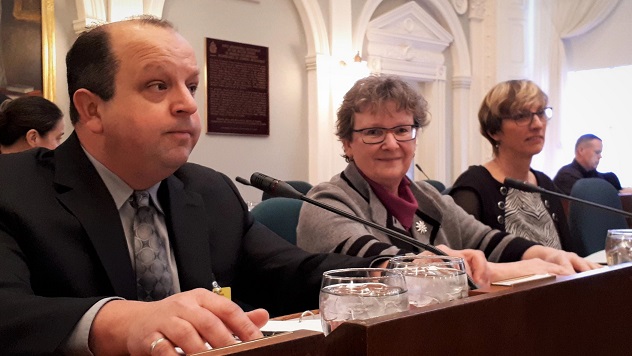Pulp Mill
Pictou County pulp mill project raises skepticism among MLAs
Public will have 30 days to comment after project is registered with province

caption
From left to right, Paul Keats (Regional Director), Frances Martin (Deputy Minister of Environment), and Lorrie Roberts (Executive Director, Policy) prepare to answer MLAs questions.
caption
From left to right: Paul Keats (regional director), Frances Martin (deputy minister of environment) and Lorrie Roberts (executive director, policy) prepare to answer questions on Wednesday.MLAs spent Wednesday’s public accounts meeting questioning the planning process for a Pictou County pulp mill.
Discussion centred on the type of environmental assessment that will be done for Northern Pulp’s new effluent treatment facility. Frances Martin, deputy minister of environment, defended the decision to use a Class 1 assessment, the shorter of two assessment options.
“Our job is to ensure that we have rigorous review of the project through the environmental assessment process, and it can absolutely be done within a Class 1 framework,” she told reporters after the meeting.
The project is supposed to create a better way to dispose of effluent, the waste water produced by the mill. For 50 years, the mill has piped effluent into the Boat Harbour lagoon, located next to Pictou Landing First Nation.
Environmental and health consequences prompted legislation that orders the mill to close by 2020.
According to Northern Pulp’s project website, the new facility is designed to process up to 85,000 cubed metres of effluent per day. The plan would see waste water cycle through an activated sludge treatment system, before being discharged into the Northumberland Strait via a pipeline that would open into Pictou Harbour.
The project has yet to be registered, but it must be approved by Environment Nova Scotia and built in the next two years in order to meet the deadline.
The assessment process
Any project requiring a provincial environmental assessment falls into either a Class 1 or Class 2 category, according to provincial guidelines.
A Class 1 assessment takes 50 days to complete. A 30-day public feedback session follows, once the project is officially registered. A Class 2 assessment takes longer — up to 275 days — and allows 110 days for public review.
Martin told MLAs the Northern Pulp project was classified as a Class 1 because it is considered a modification of an existing facility. Provincial regulations state modifications fall under Class 1 guidelines.
PC Pictou East MLA Tim Houston argued the project’s scope is comparable to the construction of a new paper mill, which would require a Class 2 assessment.
Martin insisted that both classes require equally rigorous research.
“My decision was according to the guidelines we use for all projects that need assessments,” she said. “I would not have been comfortable with making it a Class 2 because that was not the appropriate decision.”
‘30 days isn’t enough time’
Houston is worried about the repercussions of a shorter assessment.
He cited the Alton Gas project as a warning of what the future of the pulp mill project could become. Alton Gas also had a Class 1 environmental assessment.
“It was approved in 2007, but because the process did not have the confidence of the community, that project has been challenged,” he said. “Twelve years later it still isn’t done.
“Northern Pulp is a vital employer in this province. The best way to protect jobs in this province is to have people be confident in the process.”
NDP MLA Lisa Roberts agrees that 30 days isn’t enough time, especially for community groups that aren’t funded or resourced like Northern Pulp.
“The tight timelines of the Class 1 are problematic because community groups now have to gear up and process a lot of information in a short time frame to provide feedback,” she said.
“If a community wants to comment, they are scrambling to find volunteer scientists, to read the file with their computers open so they can google the terms to try and understand so they can make robust comments.”
Joan Baxter, author of The Mill: Fifty Years of Pulp and Protest, attended the meeting but didn’t find it reassuring.
“I heard a lot of semantics and playing with words out there and I found it very frustrating,” she said.
She said she was in Pictou County last week talking to community members and people are still very frustrated.
“People are not convinced that there will be any change, they feel they’ve heard all this before,” said Baxter.
When asked about potential backlash from the community about the project, Martin reminded reporters the plan is still developing.
“We’re just taking this one step at a time,” Martin said.


D
Dr Marian Walsh
C
Colette Girard
L
Lothian Taylor